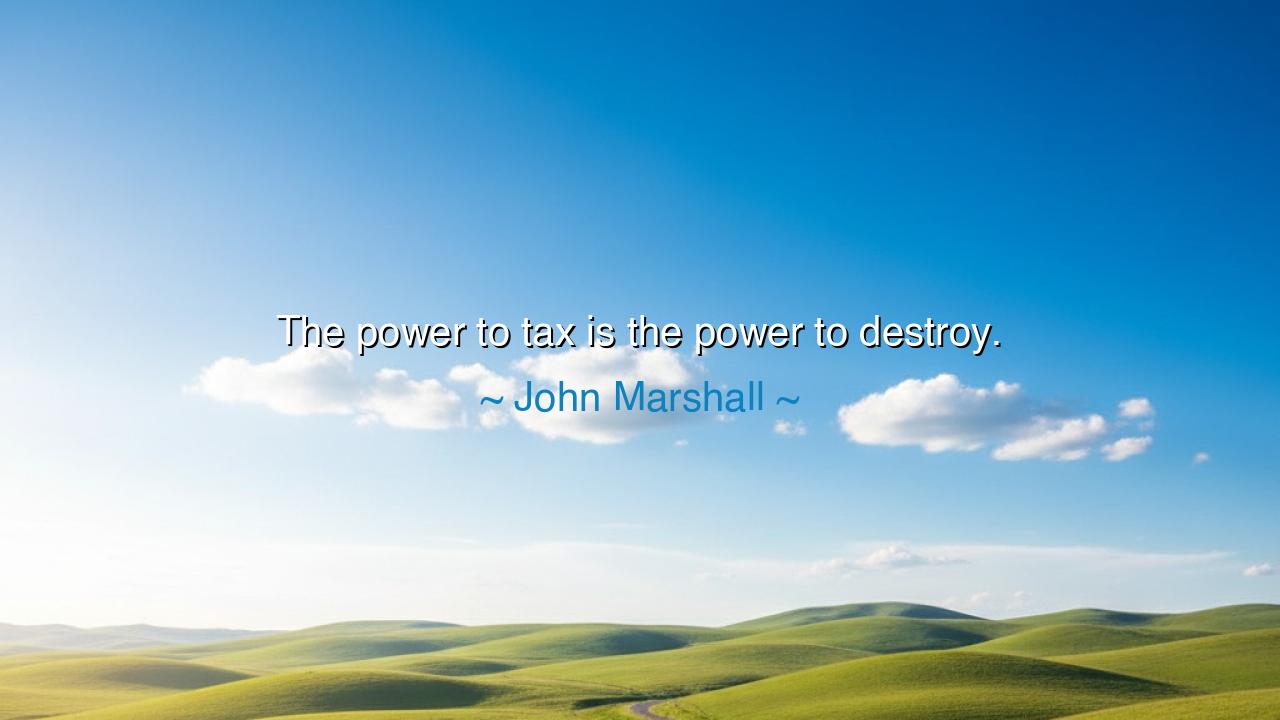
The power to tax is the power to destroy.






The words of John Marshall thunder with the gravity of law and the foresight of a statesman: “The power to tax is the power to destroy.” In this solemn declaration, the great Chief Justice of the United States revealed the double-edged nature of authority. For while taxation may sustain governments and nations, it also carries within it the seed of ruin. If wielded without justice and restraint, it can choke life from commerce, crush the livelihood of citizens, and bring whole enterprises to their knees.
Marshall spoke these words in the famous case of McCulloch v. Maryland (1819), when the state of Maryland sought to lay a tax upon the Bank of the United States. To him, this was no mere levy but a dagger pointed at the very heart of federal authority. If the states could tax the instruments of the Union, they could weaken or even destroy them. Thus his words echo as a warning: that taxation, if unchecked, may become not a tool of service but of suppression.
History has shown the truth of this maxim. In ancient Rome, when emperors demanded ever greater tribute to fuel their wars and luxuries, the burden upon the people grew unbearable. Farmers abandoned their lands, trade withered, and the empire decayed from within. What began as a system of order became an engine of destruction. Rome learned, too late, that the power to tax can erode the very foundations it was meant to support.
Yet Marshall’s teaching is not a rejection of taxation itself, but a call for vigilance. For every power granted must be bounded by justice. The ability to levy tribute can nourish the common good, but it must never be twisted into a weapon of vengeance or domination. When guided by fairness, taxation sustains the state; when corrupted, it strangles the life it was meant to protect.
Therefore, let this wisdom be preserved: the power to tax is among the most dangerous gifts entrusted to rulers. It demands prudence, humility, and a steadfast regard for liberty. Marshall’s words, spoken in the halls of justice, remain a timeless warning—that those who wield this power must remember its capacity not only to sustain nations, but to destroy them if wielded without restraint.






MMoanhh
This quote reminds me that taxation is never just about numbers—it’s about control. If a government can tax anything without restraint, it can effectively destroy any sector or dissenting voice. But complete resistance to taxation isn’t sustainable either. So how do we design systems that maintain accountability? Maybe the real destruction comes not from taxation itself, but from the erosion of trust between citizens and the state.
PPPhung Phan
Marshall’s observation feels like both a warning and a truth about human systems of power. I wonder how much of his intent was rooted in the fear of federal dominance during his time. Today, the idea still resonates whenever people debate government interference. Can a democratic society ever truly prevent the abuse of taxing power, or is that tension between authority and liberty unavoidable?
M2manh 2007
This line captures a kind of paradox: taxation is vital for collective survival, yet it carries within it the seeds of destruction if abused. It makes me think about modern economies and how tax policies often reflect deeper moral choices. Who should bear the heaviest burden—the wealthy, corporations, or everyday citizens? Maybe taxation isn’t just an economic issue but a mirror of a nation’s values.
TNTrinh Nguyen
What strikes me about this quote is how timeless it feels. Even now, taxation remains one of the most contested aspects of governance. It’s a reminder that power over money often translates into power over people. I can’t help but wonder—does taxation inherently create inequality, or is it only destructive when it becomes a tool for political control rather than public good?
NHNhu Huynh
I find this statement a bit alarming but also thought-provoking. It suggests that something meant to sustain civilization could also destroy it if misused. Do you think Marshall meant this as a literal warning or more as a philosophical statement about government overreach? It feels incredibly relevant today, with debates about corporate taxes, wealth redistribution, and economic justice still raging centuries later.